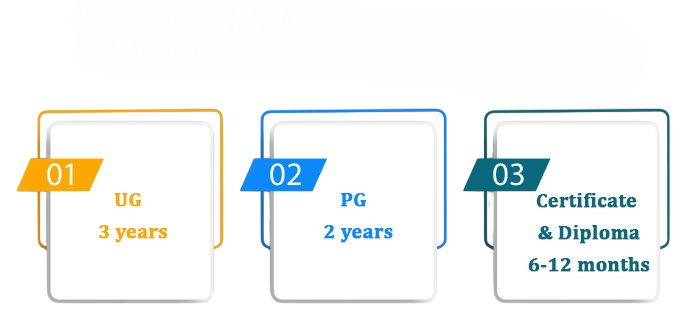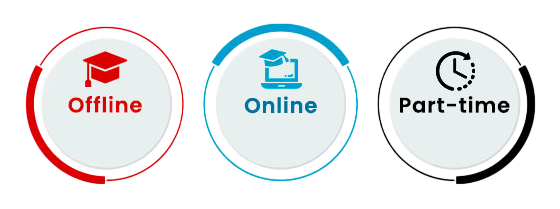
- What is MSc in Data Science?
- Eligibility and Admission
- Course Duration and Format
- Core Subjects and Syllabus
- Programming Tools and Software Used
- Internship and Capstone Projects
- Career Opportunities
- Study Abroad Options
- Online vs On-Campus vs Part-time Programs
- Salary Expectations
- Scope and Industry Demand
- Conclusion
What is MSc in Data Science?
MSc in Data Science is a postgraduate degree that provides students with in-depth knowledge of the principles and techniques of data analysis and statistical modeling. The course emphasizes the application of machine learning, artificial intelligence, data mining, data visualization, programming, and Softskills Training to solve real-world problems effectively. It is designed to equip students with the technical, analytical, and problem-solving skills required to handle complex datasets, perform statistical analysis, and derive actionable insights. The program combines knowledge from computer science, statistics, and mathematics, preparing graduates to excel in the rapidly growing field of data science.
Eligibility and Admission
- Academic Background: To be eligible for an MSc in Data Science, candidates typically need a bachelor’s degree in Computer Science, Mathematics, Engineering, Statistics, or any related discipline. However, some universities may also accept candidates from other backgrounds if they have a strong foundation in mathematics and programming.
- Minimum Marks: The minimum academic requirement varies across universities, but generally, candidates need a minimum of 50% to 60% Commerce Career Options in their undergraduate degree.
- Entrance Exams: Some institutions conduct entrance exams to assess the aptitude of the candidates in mathematics, programming, and logical reasoning. Examples include IIT JAM (for IITs), GATE (for some institutes), and university-specific tests.
- Other Requirements: Some institutions may require work experience, especially in data-related roles, while others may require applicants to submit a Statement of Purpose (SOP) or Letters of Recommendation (LORs).
- Application Submission: Candidates must submit their applications to the respective universities or institutions either online or offline. This includes personal details, academic records, entrance exam scores (if applicable), and other supporting documents.
- Entrance Exam (if applicable): Candidates who are required to take an entrance exam will be tested on subjects like mathematics, computer programming, logical reasoning, and general aptitude.
- Personal Interview (if applicable): Based on the entrance exam or application performance, some institutions may conduct personal interviews to assess the applicant’s communication skills, interest in data science, and future goals.
- Final Selection: After the entrance exams and interview, candidates will be selected based on their overall performance in the entrance exam, academic background, and interview (if applicable).
Eligibility Criteria:
Admission Process:
Course Duration and Format
The duration of an MSc in Data Science typically spans 2 years, divided into four semesters. The course is offered in two main formats:

Full-time: The majority of MSc in Data Science programs are full-time, requiring students to attend classes regularly, complete assignments, participate in projects, and attend internships.
Part-time/Online: For working professionals or those who cannot attend full-time programs, many universities and institutes offer part-time or online MSc Data Science courses. These programs may take longer to complete (usually 3-4 years) and often include flexible study hours.
Do You Want to Learn More About Aptitute and reasoning? Get Info From Our Aptitute and reasoning certification Training Today!
Core Subjects and Syllabus
Building a solid foundation in mathematics, programming, machine learning, and ethical data practices is the goal of the MSc in Data Science programme. Fundamental mathematical ideas that are necessary for data modelling, including linear algebra, probability, statistics, calculus, and optimisation techniques, are taught to students first. Python, R, data structures, object-oriented programming, and big data technologies like Hadoop and Spark are all ways to improve your programming abilities. Along with data pretreatment, exploratory data analysis (EDA), and effective visualisation tools like Tableau and Matplotlib, Non-Coding IT Jobs the course also focuses on data analysis and visualisation. A crucial element is machine learning, which includes deep learning, neural networks, support vector machines (SVM), reinforcement learning, supervised and unsupervised learning, and more. Students also gain knowledge in data warehousing, data mining techniques, database administration, and working with both SQL and NoSQL databases. Included are subjects related to artificial intelligence, including computer vision, natural language processing (NLP), and fundamental AI concepts. Important topics including data ethics, privacy rules (GDPR, CCPA), and governance are included in the syllabus.
Would You Like to Know More About Aptitute and reasoning? Sign Up For Our Aptitute and reasoning certification Training Now!
Programming Tools and Software Used
Data Science relies heavily on various programming languages and software tools. Some of the key tools and technologies used during the course include:
- Programming Languages:
- Python: Widely used for its simplicity and availability of libraries like NumPy, Pandas, and Scikit-learn.
- R: Preferred for statistical analysis and data visualization.
- SQL: For querying databases and managing structured data.
- Java: Sometimes used in big data technologies. Data Science Libraries and Frameworks:
- TensorFlow and Keras for machine learning and deep learning.
- PyTorch for neural networks and AI applications.
- Scikit-learn for traditional machine learning algorithms.
- Pandas and NumPy for data manipulation and analysis.
- Matplotlib and Seaborn for data visualization. Big Data Tools:
- Apache Hadoop and Spark for handling large-scale data processing. Data Visualization Tools:
- Tableau and Power BI for creating interactive dashboards and visualizations.
Internship and Capstone Projects
Internships and capstone projects are integral components of the MSc in Data Science program. They provide students with hands-on experience and a practical understanding of how data science methodologies are applied in the real world. Some key points include:
Internships: Many universities collaborate with industry partners to offer students opportunities to work in real-world data science roles during the course. Internships help students gain practical skills in analyzing large datasets, M.Tech Salary in India building machine learning models, and solving business problems.
Capstone Projects: These are comprehensive, real-world projects where students apply their learning to solve complex problems. It could be in the form of data analysis, predictive modeling, or deploying machine learning models.
Career Opportunities
Numerous career options in various industries are accessible to those with an MSc in Data Science. Graduates are prepared to work as business intelligence analysts, data scientists, data analysts, machine learning engineers, and data engineers.Big Data Engineer, AI Researcher, Quantitative Analyst (Quant), Data Visualization Expert, Data Science Consultant, and roles requiring strong Softskills Training are some typical career options. In industries where data-driven decision-making is growing crucial, such as technology, finance, healthcare, marketing, and e-commerce, these positions are highly sought for. Because data is constantly growing across industries, workers with strong data science abilities are in high demand and have great opportunities for career advancement.
Gain Your in Aptitude and reasoning Training by Enrolling in Our Aptitude and reasoning training Now!
Study Abroad Options
Studying abroad for an MSc in Data Science offers exposure to global practices and cutting-edge research. Some of the top international universities offering Data Science programs include:
- University of California, Berkeley (USA)
- University of Oxford (UK)
- Massachusetts Institute of Technology (MIT) (USA)
- ETH Zurich (Switzerland)
- University of Melbourne (Australia)
- Online Programs: Offer flexibility, allowing students to balance work and study. However, they may lack the hands-on opportunities and networking experiences available in on-campus programs.
- On-Campus Programs: Provide a structured learning environment with opportunities for in-person interactions, hands-on labs, and direct access to faculty and industry experts. However, they may require relocation and full-time commitment.
- Part-Time Programs: Students who wish to earn a master’s degree at a more manageable pace while still working. Promotes a better work-life balance while learning Leadership Theories gives material absorption a more consistent, manageable pace. Depending on the demands, it can be pursued online or on campus but it requires more time to finish than a full-time programs, demands dedication and excellent organising abilities to balance study with other obligations can offer less chances for in-depth immersion than a programme that is offered full-time on campus.
- Entry-level Data Scientist: ₹6-8 lakh per annum
- Mid-level Data Scientist: ₹10-15 lakh per annum
- Senior Data Scientist/Lead: ₹20-30 lakh per annum
These institutions provide world-class education, with opportunities for internships, research projects, and collaborations with leading data-driven companies.
Online vs On-Campus vs Part-time Programs
Both online and on-campus MSc in Data Science programs have their advantages:

Preparing for Aptitude and reasoning Job? Have a Look at Our Blog on Aptitude and reasoning training To Acte Your Interview!
Salary Expectations
The salary of a data science professional varies depending on factors such as job role, experience, location, and company. On average:
Salaries may vary based on industry and location, with tech giants and startups offering higher compensation packages.
Scope and Industry Demand
The demand for data science professionals is expected to grow significantly, driven by the increasing reliance on data-driven decision-making in business.Industries such as finance, healthcare, e-commerce, and manufacturing are investing heavily in data analytics, GATE Exam Eligibility Criteria ensuring strong career prospects for data science graduates. According to the job market trends, the number of job postings for data science roles has been rising consistently, making it a high-demand field. Furthermore, the increasing adoption of AI, machine learning, and big data technologies across sectors further reinforces the growing need for skilled data scientists.
Conclusion
An MSc in Data Science is a promising pathway for individuals seeking to advance their careers in the rapidly growing field of data analytics and artificial intelligence. With the right blend of technical, analytical, and problem-solving skills, graduates can access lucrative job opportunities across industries. Whether pursuing the course on-campus or online, students are poised to be at the forefront of this exciting and ever-evolving field. If you want to work in one of the most sought-after industries today, earning an MSc in Data Science can be a game-changer, especially when combined with Softskills Training to enhance communication, teamwork, and problem-solving abilities. With a curriculum that combines machine learning, programming, statistics, and real-world applications, the course gives students the tools they need to tackle challenging data challenges in a variety of industries. The options are numerous, ranging from research and consultancy positions to well-paying positions like Data Scientist and Machine Learning Engineer, regardless of whether you decide to study full time, part time, online, or overseas. Professionals with strong technical and analytical skills will continue to be highly sought after in the labour market as long as companies continue to rely on data-driven initiatives.


